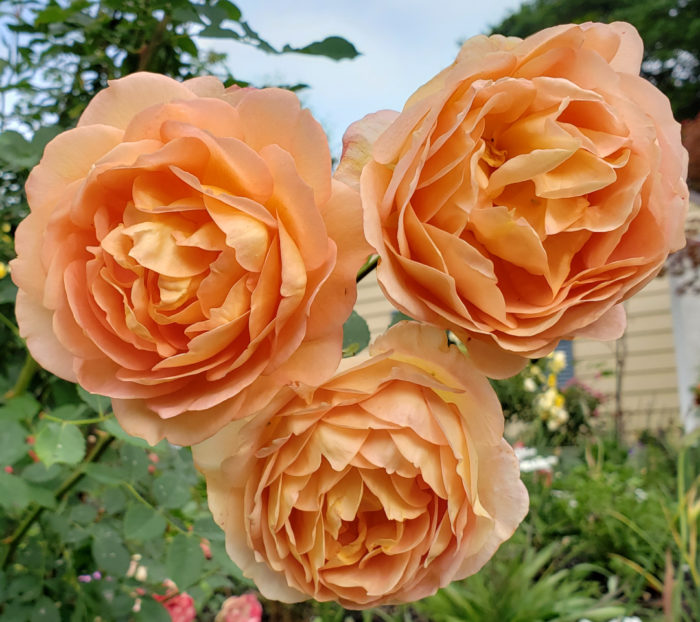
Today’s photos come from Doug and Elaine Downing of Kennett Square, Pennsylvania.
Our garden has some wonderful roses. But like many rose growers, we have seen a lot of trial and error. We are in southeastern Pennsylvania (Zone 7a), a climate with hot and humid summers. We’ve selected roses that are hardy (disease-resistant), prolific, and beautiful, that don’t mind the heat and humidity, and that bloom throughout the summer and into the fall. We also use only organic fertilizer, some chelated iron, compost, mulch, and water—nothing more. Many roses do not thrive on that simple regimen, and we have grown (and discarded) many of them. Some produced beautiful but disappointingly few blossoms (all of the tea roses were excluded on that score). Others produced superb blossoms but soon succumbed to black spot. Most simply failed to thrive in our hot and humid climate. We’ve found that well more than half of the roses we’ve tried to grow over the last twenty years are no longer in our gardens. But those that have lasted have flourished.
For other gardeners with a similar climate, and for those who favor a more organic approach to their gardens, below are some photos of nine roses that have brightened our gardens for many years.
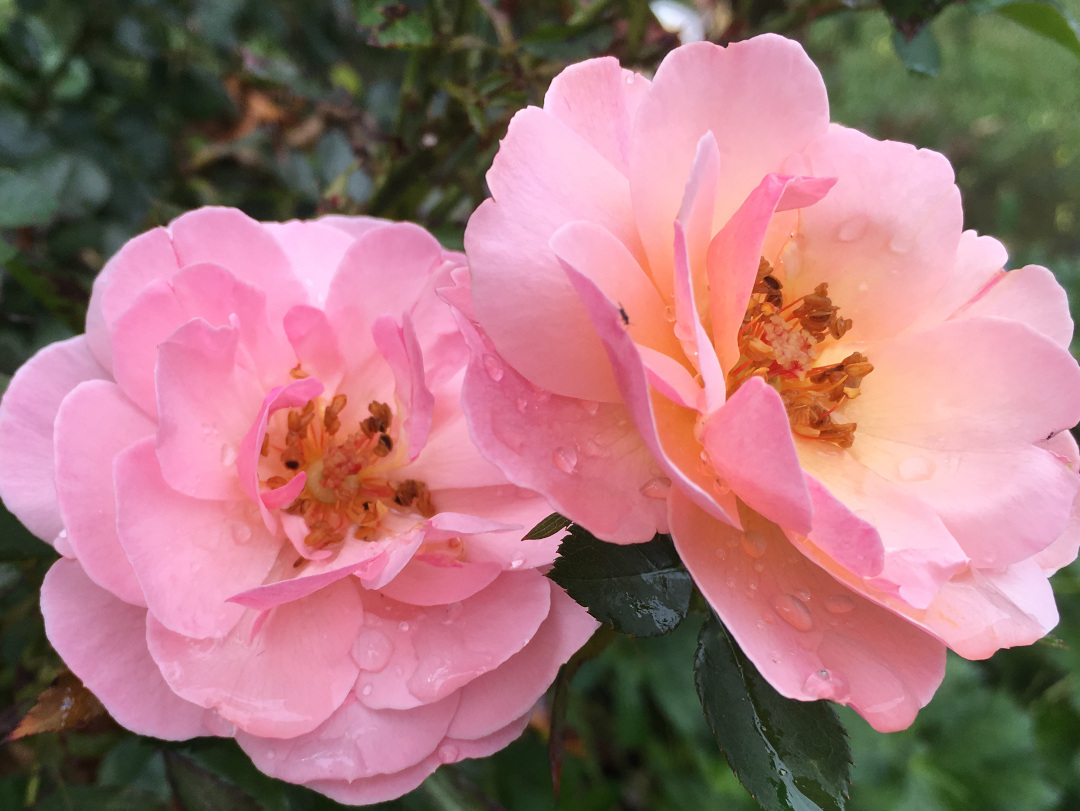 Calypso is a medium-height rose that is covered with simple, apricot/rose blossoms. The foliage is deep green and contrasts wonderfully with the profusion of blossoms. Calypso is a shrub rose.
Calypso is a medium-height rose that is covered with simple, apricot/rose blossoms. The foliage is deep green and contrasts wonderfully with the profusion of blossoms. Calypso is a shrub rose.
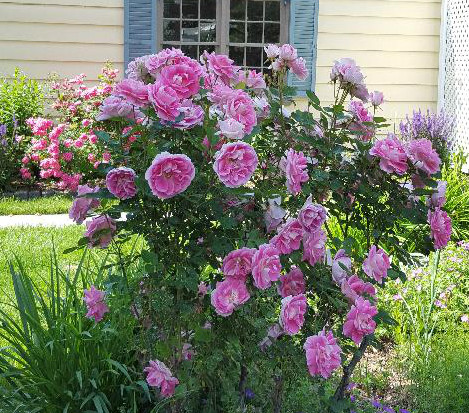 Carefree Wonder is a cupped rose with pink blossoms that fade to light pink or white on the back. A tall rose, it grows to about 5 feet in height and 4 feet in width, and it’s extremely prolific with blossoms. This also is a shrub rose. All of these roses are watered only in the morning, to reduce the potential of black spot.
Carefree Wonder is a cupped rose with pink blossoms that fade to light pink or white on the back. A tall rose, it grows to about 5 feet in height and 4 feet in width, and it’s extremely prolific with blossoms. This also is a shrub rose. All of these roses are watered only in the morning, to reduce the potential of black spot.
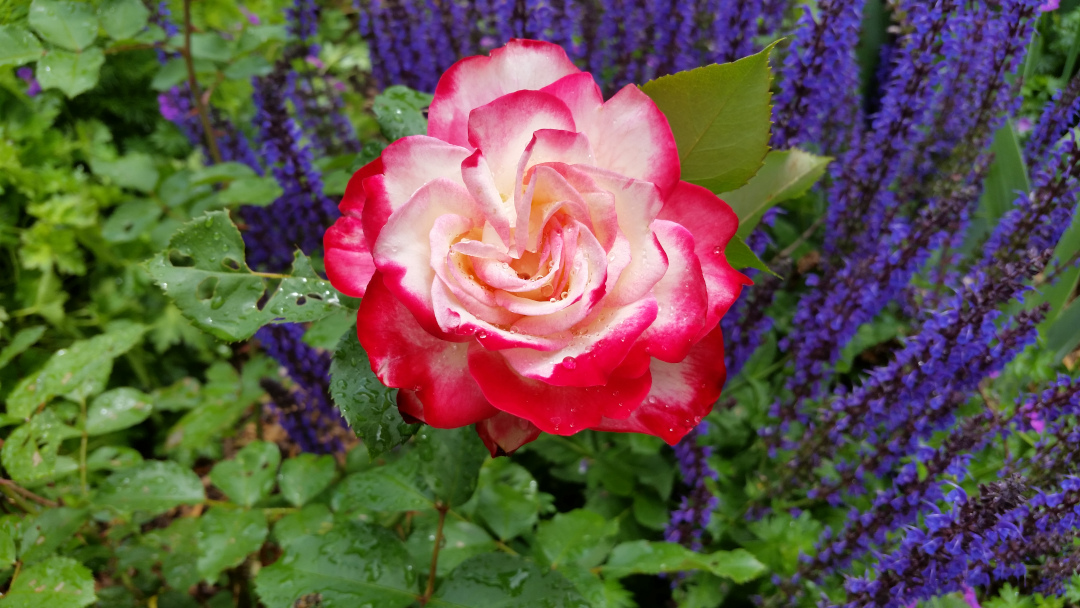 Cherry Parfait is a small rose (smaller than the catalogs suggest) that you can’t miss. Ours grow about 2 feet tall and wider than they are high. The blossoms are a distinctive red and white, and are stunning when highlighted against the deep blue of the salvia surrounding them. Cherry Parfait is a grandiflora rose.
Cherry Parfait is a small rose (smaller than the catalogs suggest) that you can’t miss. Ours grow about 2 feet tall and wider than they are high. The blossoms are a distinctive red and white, and are stunning when highlighted against the deep blue of the salvia surrounding them. Cherry Parfait is a grandiflora rose.
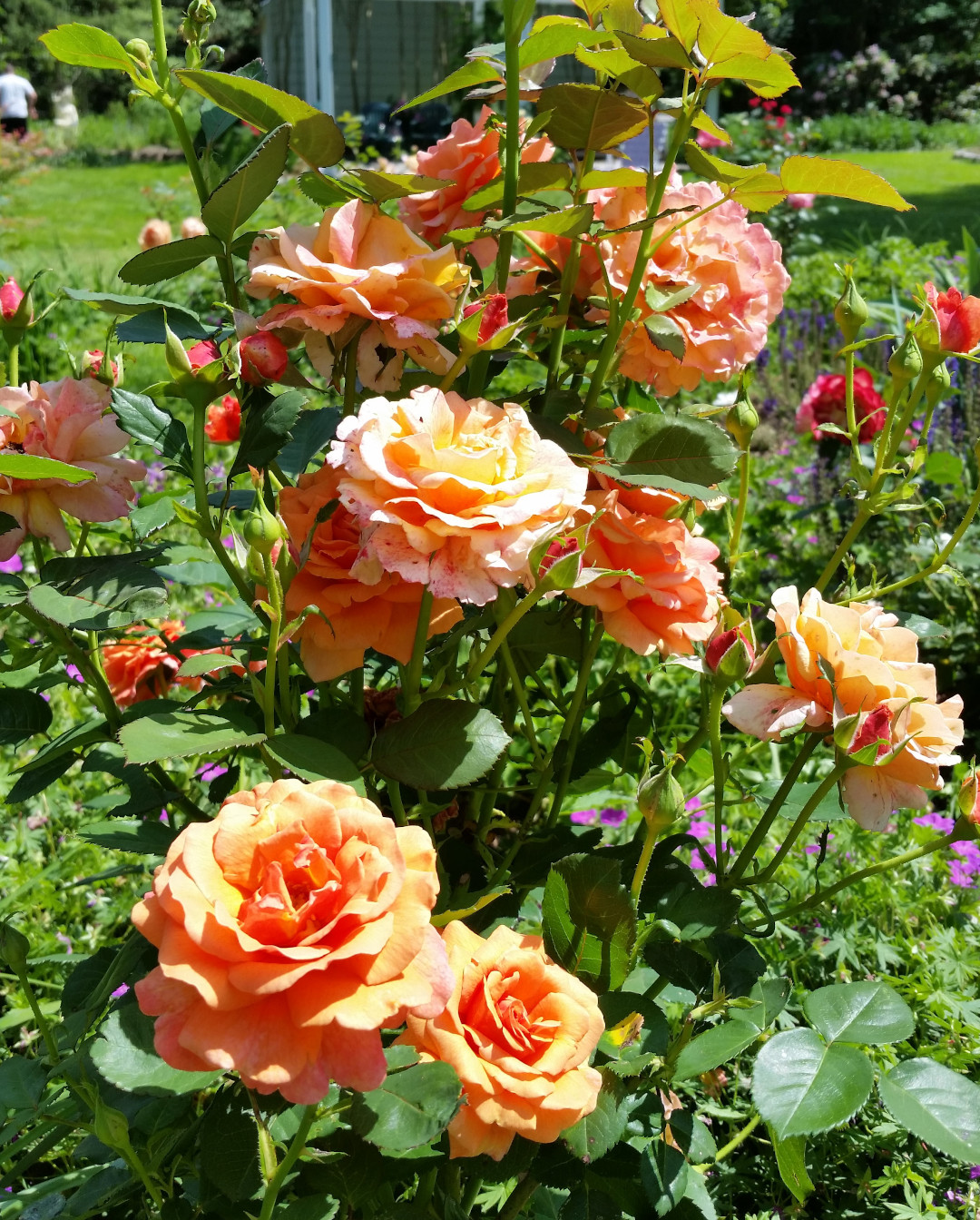 Easy Does It is a delight in the garden. The blossoms range across orange, mango, peach, pink, and apricot. This rose is the favorite of Japanese beetles, but we’ve found that if you can keep them from laying eggs in your lawn, they will migrate someplace else. Cut the top off a gallon jug, and fill it with a few inches of soapy water. In the early morning (don’t even bother if it’s after about 9:00) position the jug under the beetles so that when they roll off the flower, they fall into the water. Two years ago I was catching about 25 a day, and last year I had fewer than fifteen all summer. Easy Does It is a floribunda rose and is deliciously fragrant.
Easy Does It is a delight in the garden. The blossoms range across orange, mango, peach, pink, and apricot. This rose is the favorite of Japanese beetles, but we’ve found that if you can keep them from laying eggs in your lawn, they will migrate someplace else. Cut the top off a gallon jug, and fill it with a few inches of soapy water. In the early morning (don’t even bother if it’s after about 9:00) position the jug under the beetles so that when they roll off the flower, they fall into the water. Two years ago I was catching about 25 a day, and last year I had fewer than fifteen all summer. Easy Does It is a floribunda rose and is deliciously fragrant.
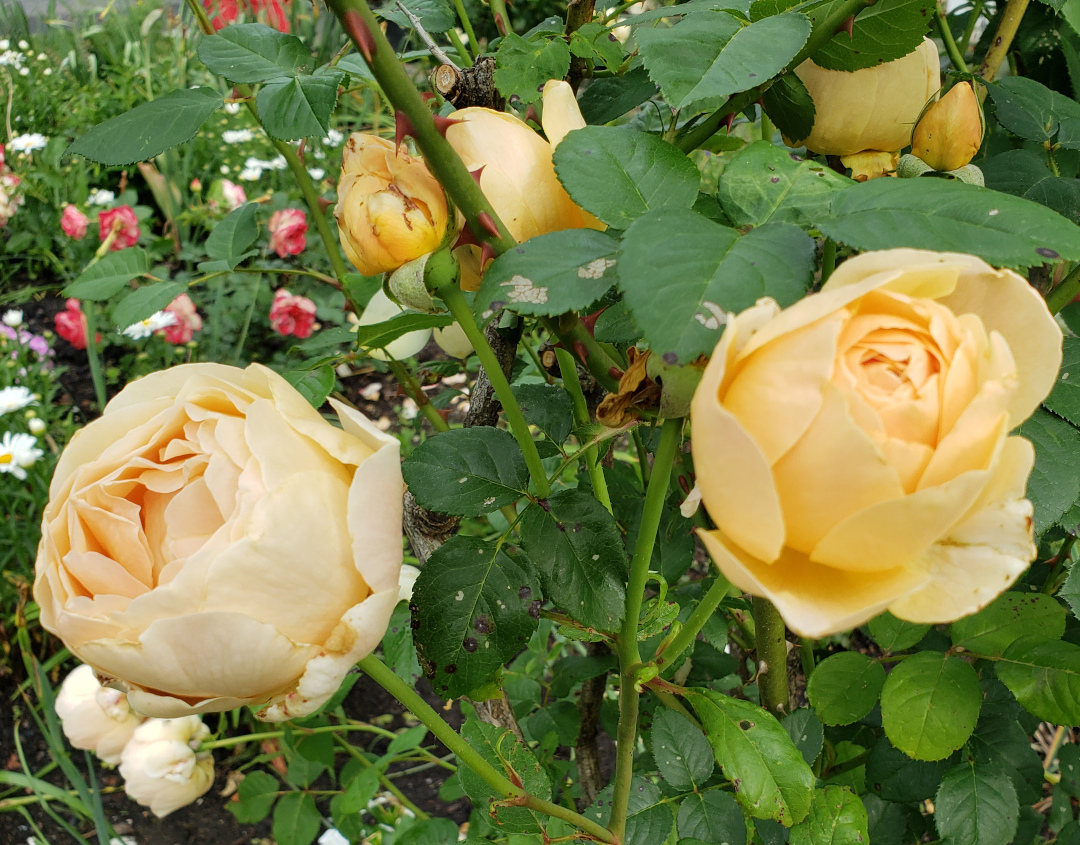 Jude the Obscure is the most fragrant rose in the garden. It is superb as a cut rose, although it is also the first to lose its petals. This rose has a graceful dreamy yellow cup shape, edging toward a deeper yellow when the blossoms first open. This is a very tall English shrub rose by David Austin.
Jude the Obscure is the most fragrant rose in the garden. It is superb as a cut rose, although it is also the first to lose its petals. This rose has a graceful dreamy yellow cup shape, edging toward a deeper yellow when the blossoms first open. This is a very tall English shrub rose by David Austin.
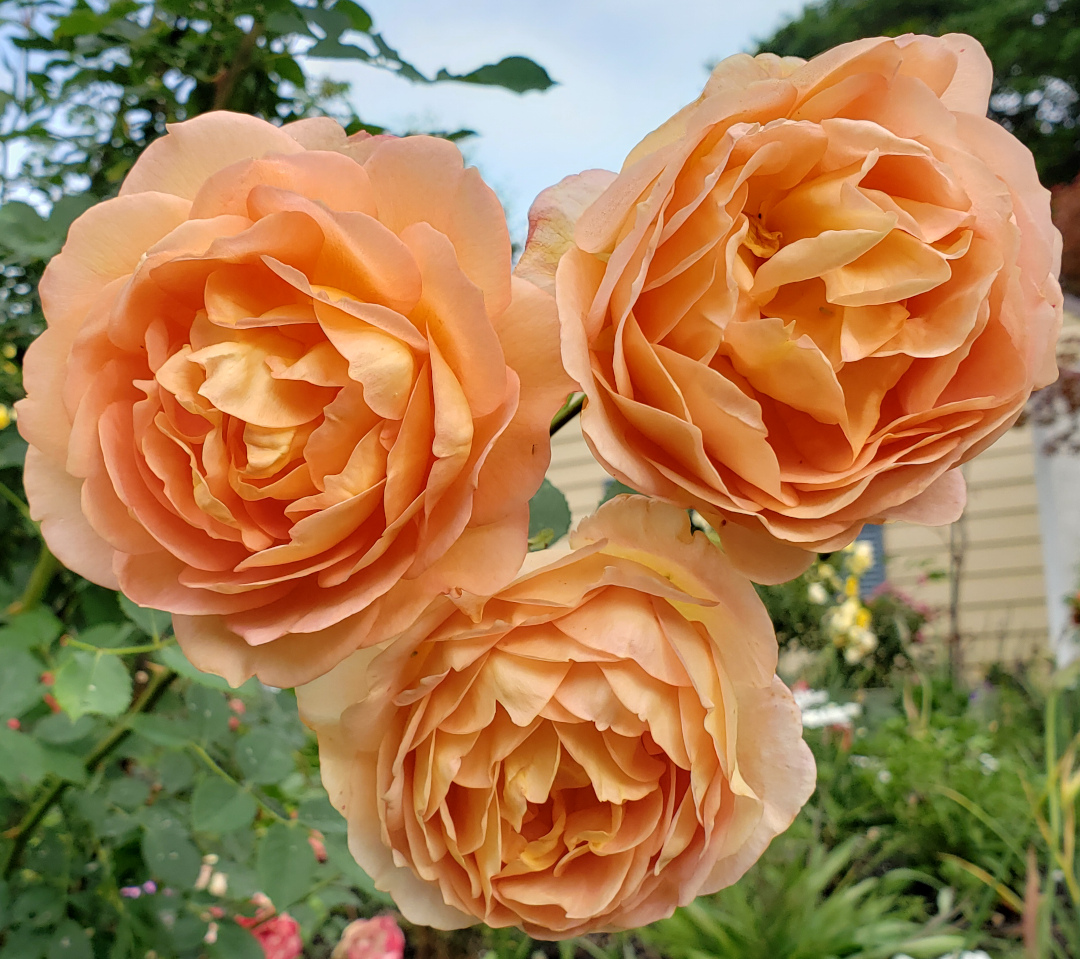 Lady of Shallot is one of the most prolific bloomers, and also one of the most fragrant. Its cupped blossoms are an eye-catching peach and can completely cover the plant. All of the roses in our garden bloom all summer, blossoming from spring until the first hard frost in October or November. Lady of Shallot is a tall English shrub rose by David Austin.
Lady of Shallot is one of the most prolific bloomers, and also one of the most fragrant. Its cupped blossoms are an eye-catching peach and can completely cover the plant. All of the roses in our garden bloom all summer, blossoming from spring until the first hard frost in October or November. Lady of Shallot is a tall English shrub rose by David Austin.
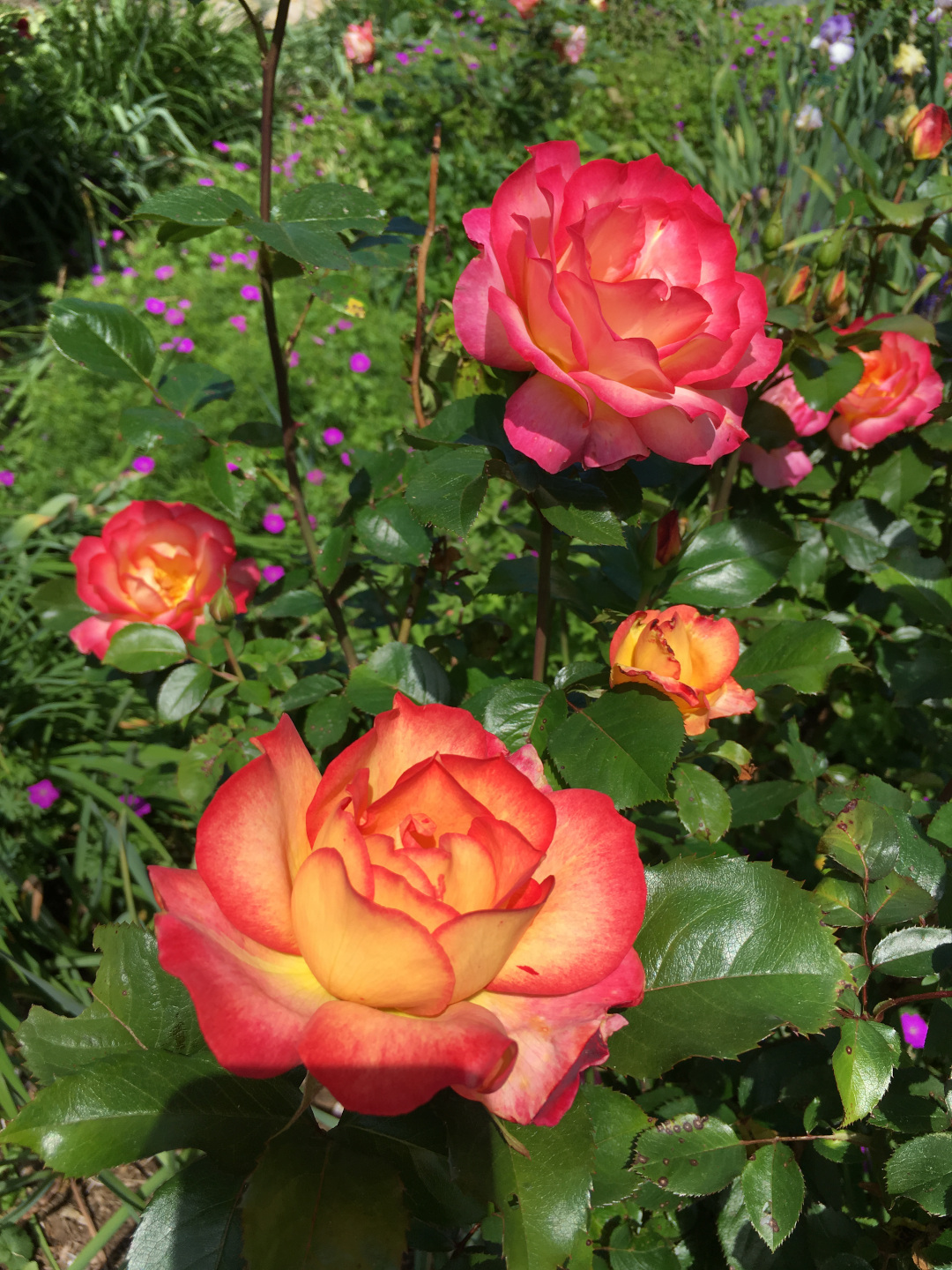 Rainbow Sorbet has one of the most beautiful blossoms, in shades of red and yellow that intensify in the cooler temperatures at the end of summer. Extremely prolific, it is the first to blossom in the spring. This is a tall floribunda rose.
Rainbow Sorbet has one of the most beautiful blossoms, in shades of red and yellow that intensify in the cooler temperatures at the end of summer. Extremely prolific, it is the first to blossom in the spring. This is a tall floribunda rose.
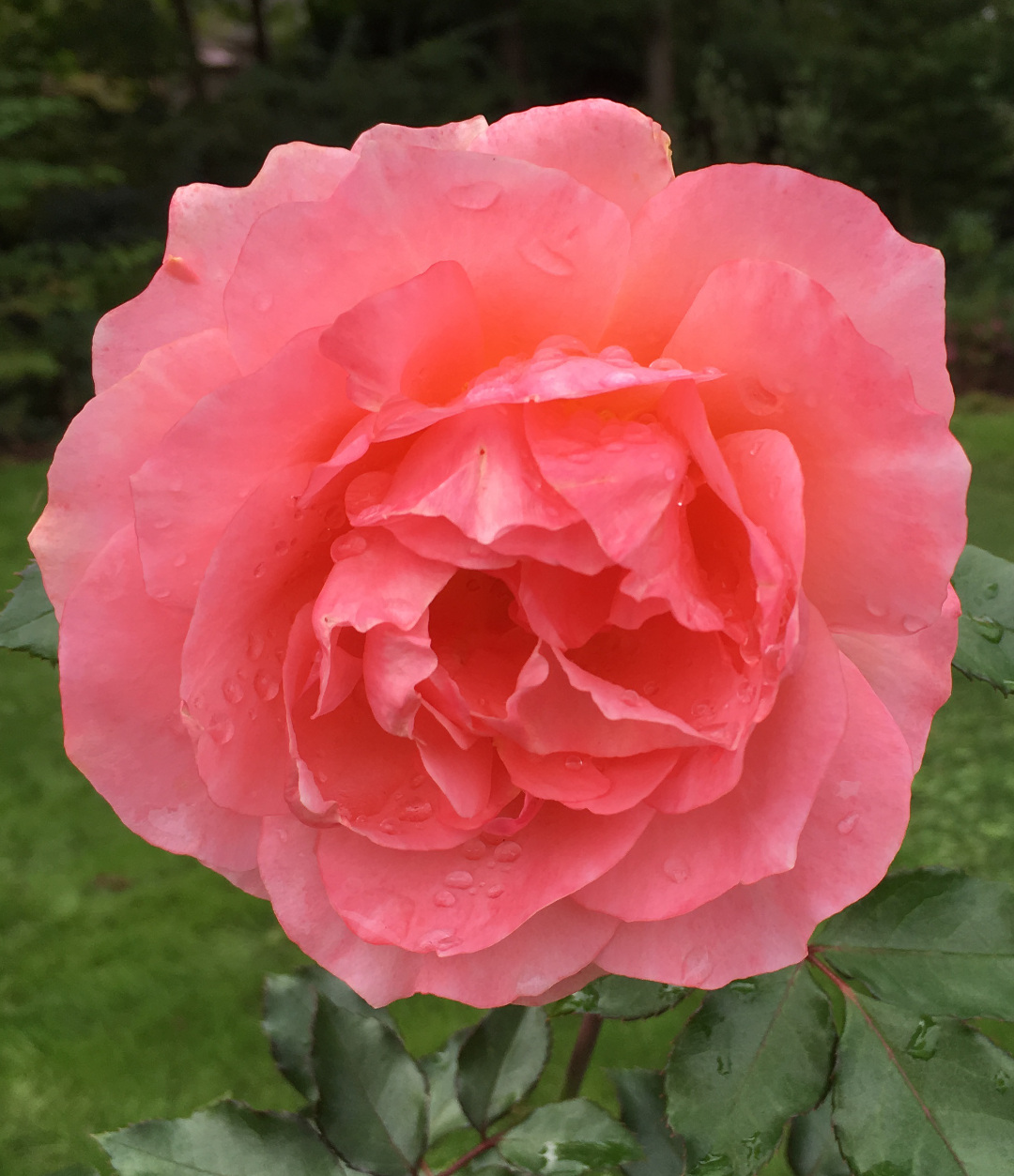 Sweet Fragrance is medium-sized rose with a profusion of delicate pink blossom that can completely cover the plant. Despite its name, it’s fragrance is mild, although certainly sweet. Sweet Fragrance is a grandiflora rose. All of the roses in our gardens are mulched over the winter, with cones built up to about 12 inches around the stems, and then they get a layer of compost in the spring.
Sweet Fragrance is medium-sized rose with a profusion of delicate pink blossom that can completely cover the plant. Despite its name, it’s fragrance is mild, although certainly sweet. Sweet Fragrance is a grandiflora rose. All of the roses in our gardens are mulched over the winter, with cones built up to about 12 inches around the stems, and then they get a layer of compost in the spring.
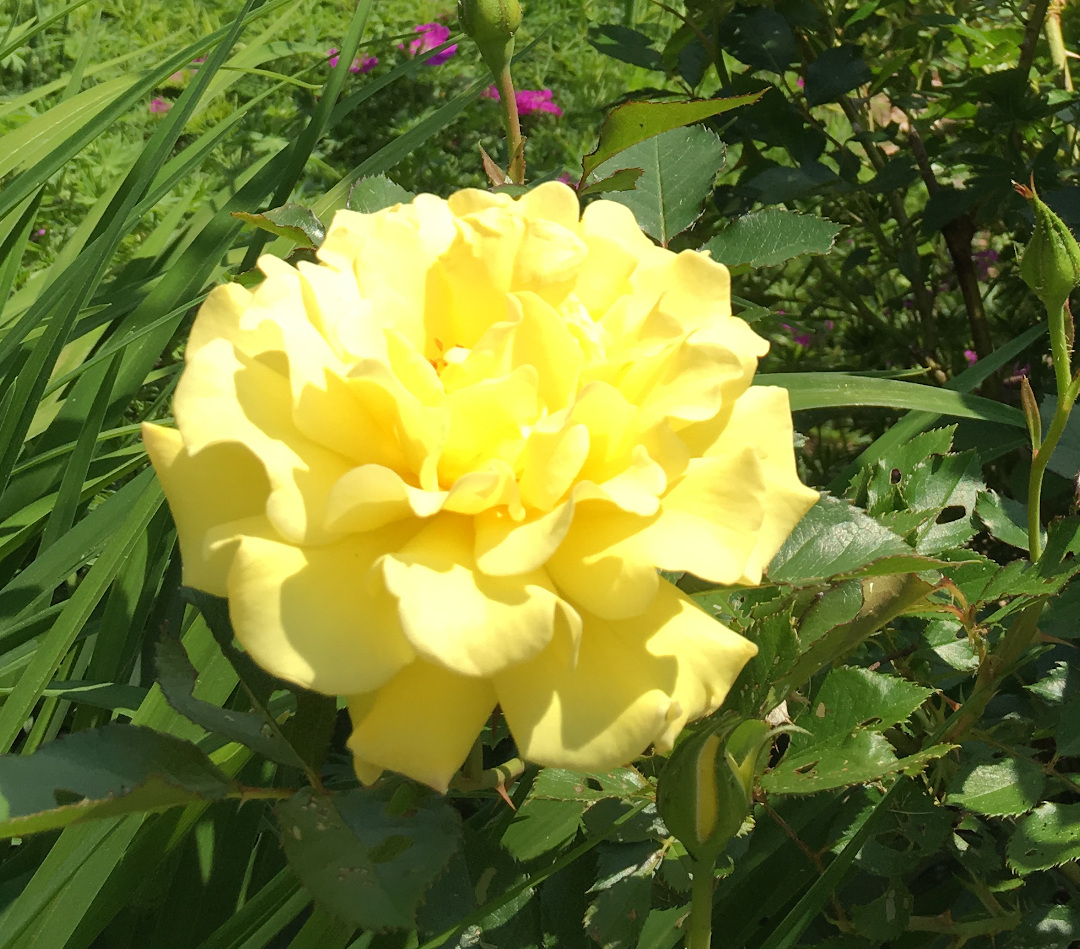 Yellow Submarine is one of the most prolific of all our roses. It’s also one of the most beautiful, with blossoms starting out deep yellow and then fading to nearly white as they mature. The plant will be covered by blossoms at all different shades during summer, and it is fascinating to watch it change. This rose is highly fragrant and makes wonderful cut flowers. This is a tall shrub rose.
Yellow Submarine is one of the most prolific of all our roses. It’s also one of the most beautiful, with blossoms starting out deep yellow and then fading to nearly white as they mature. The plant will be covered by blossoms at all different shades during summer, and it is fascinating to watch it change. This rose is highly fragrant and makes wonderful cut flowers. This is a tall shrub rose.
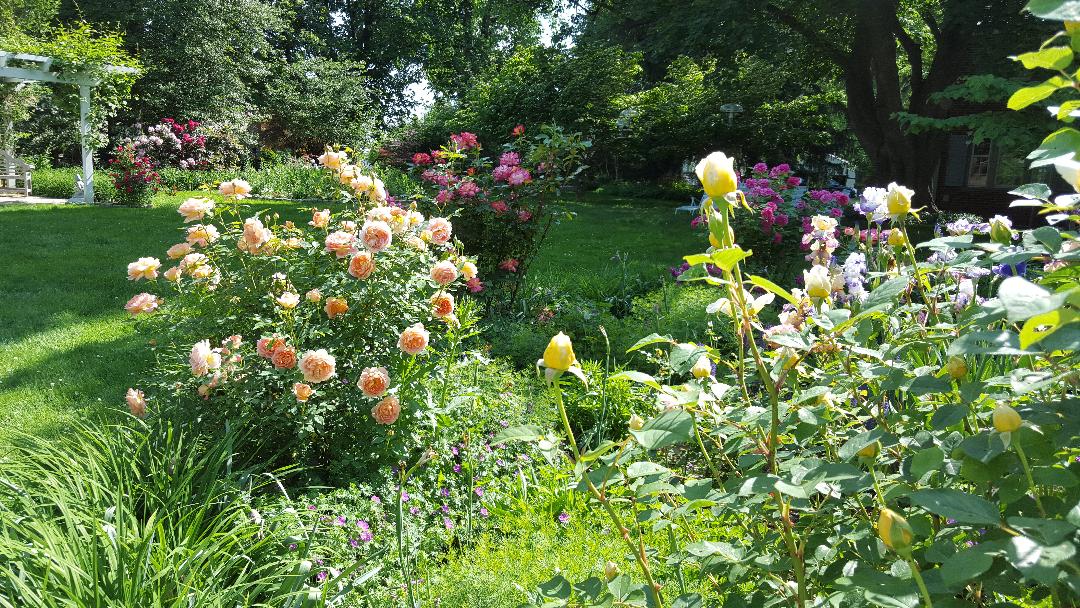 The last photo shows part of the rose garden in the spring, with Lady of Shallot (left) and Rainbow Sorbet (behind) in full bloom, and the buds of Yellow Submarine in the foreground. A list of roses that flourish in our area should also include the Knockout roses—we have both pink and red (one can be seen by the pergola in the far background)—but these seem to grow well nearly everywhere. Daybreaker, a peach-colored medium-tall floribunda, is the last rose we have added to our gardens, and we expect that in a year or two it will be added to our list of flourishing roses.
The last photo shows part of the rose garden in the spring, with Lady of Shallot (left) and Rainbow Sorbet (behind) in full bloom, and the buds of Yellow Submarine in the foreground. A list of roses that flourish in our area should also include the Knockout roses—we have both pink and red (one can be seen by the pergola in the far background)—but these seem to grow well nearly everywhere. Daybreaker, a peach-colored medium-tall floribunda, is the last rose we have added to our gardens, and we expect that in a year or two it will be added to our list of flourishing roses.
Have a garden you’d like to share?
Have photos to share? We’d love to see your garden, a particular collection of plants you love, or a wonderful garden you had the chance to visit!
To submit, send 5-10 photos to [email protected] along with some information about the plants in the pictures and where you took the photos. We’d love to hear where you are located, how long you’ve been gardening, successes you are proud of, failures you learned from, hopes for the future, favorite plants, or funny stories from your garden.
If you want to send photos in separate emails to the GPOD email box that is just fine.
Have a mobile phone? Tag your photos on Facebook, Instagram or Twitter with #FineGardening!
You don’t have to be a professional garden photographer – check out our garden photography tips!
Do you receive the GPOD by email yet? Sign up here.

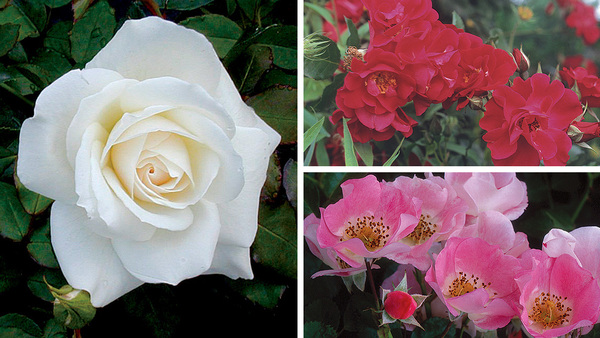



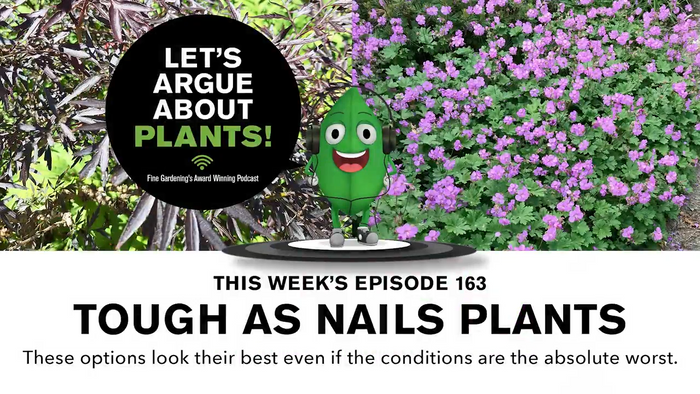
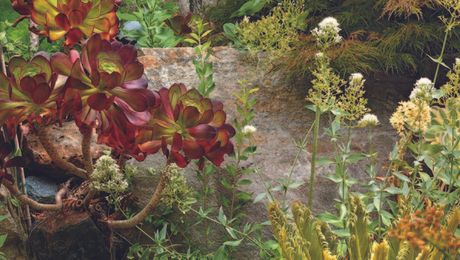
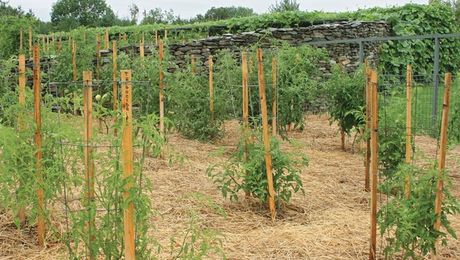









Comments
Thanks for the info! I was lusting after David Austin roses too and live in Hockessin, De.- not too far from you! I may give a few of these a try. Your roses are beautiful!
We've tried more than ten David Austin roses and these have been the best of all of them (and they are among the fragrant too). We've found that a lot of the David Austin roses don't do well in our climate (or in the hard clay soil of Delaware), but these two are superb.
On the other hand, if you really like something, then try it! You just have to be willing to pull it out and replace it if you find it doesn't work out. We've done it many times.
So very, very pretty!
It's so good the learn from your actual trial and error, and your descriptions of what is actually very fragrant! So often I have to rely on the description given by the seller...so I am happy to learn of the two most fragrant roses in your garden!
And-
Your rose garden looks fabulous! Thanks for sharing!
Thank you! The trial and error can be hard to do. When one gives up on a plant and pulls it out, one has a tendency to feel a bit like a failure, but after a lot of experience, I've come to think it's just part of the learning process. Just as the catalogs aren't always exactly right about the fragrance, they also aren't always exactly right about what's going to thrive in your garden. So we're happy to share our experience and we hope that what has worked for us will also work for others.
Wish I could sniff them! : ) The colors are so gorgeous, especially the Lady of Shallot.
Elaine says that smelling 'Jude the Obscure' for yhe first time is one of the highlights of the summer!
Thanks for the truly informative post that may be helpful to many of us in reasonable proximity to Kennet Square.
Here in NorthWest Philadelphia, we've also had great success with the low shrub rose 'Peach Drift' which seems to remain easily available because of its success locally. I also have had good success with a taller shrub rose called 'Tequila' which transitions from a mango orange color into pink. It's not nearly as floriferous, though, with about four or five bloom cycles each season, but not continuous flower.
And I keep being drawn to 'Cinco de Mayo', an indescribable earthy red, single flowering variety I see in others gardens each year.
Elaine says she's read about both Peach Drift and Tequila and they both sound promising for this area (and for an area where you'd want shrub roses).I think we're out of space for new roses - for today, at least... - but these are suggestions worth remembering.
Thank you so much by letting us benefit from your experience - this is truly one of the most helpful posts I've read, as we also live in the hot, humid midwest - 6A but summer days in the mid 90's and higher fairly routinely, and high humidity. I've also had great luck with "At Last", a fairly new soft orange disease resistant rose that blooms all summer and up to frost for us. The Japanese beetles also love it more than anything else, but, in addition to your tip about picking the beetles off in early morning (very satisfying) there is another hint given by our local grower: As soon as you see your first Japanese beetle, cut off all blooms and buds that you can find on your rose. Yes, it is hard to do! But, the bush is not as attractive, and by the time the buds are reset and starting to open, your beetle season should be about over. You might have to cut just a few early ones. It has worked very well for me over the past few years. One more word of hope- some of our birds are starting to figure out that the Japanese beetles are good to eat - I've seen bluebirds working on them in our pasture.
'At Last' has gotten some good press, but i haven'y seen it growing around here yet. It's a beautiful rose that is on our list for the next time decide to expand. Thanks for your suggestions on the Japanese Beetles. I hope others will see that we don't have to spray to control them. And a big cheer for the Bluebirds!
All my favorite colors! So beautiful I'd love to try them all and reestablish my rose garden. But I'd need less cold and more sun. Beautiful photos and helpful information.
Thank you! I remember the red rose next to the house in Waltham, which I think was an inspiration for all of us. I don'y know if it had a name, but I remember it brightened the Spring every year. I think that's what started it all.
I remember that one- I've tried to recreate that memory several times here- no success yet. Maybe I should try again...
Log in or create an account to post a comment.
Sign up Log in